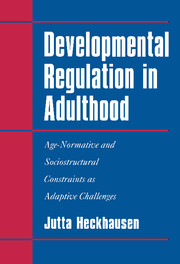 Developmental Regulation in Adulthood
Developmental Regulation in Adulthood Book contents
- Frontmatter
- Contents
- Acknowledgments
- List of Tables and Figures
- Introduction
- 1 Selectivity and Failure Compensation as Fundamental Requirements of Human Behavior and Development
- 2 The Life Course as a Context of Action
- 3 Primary and Secondary Control across the Life Span
- 4 A Model of Developmental Regulation across the Life Span
- 5 Developmental Goals as Organizers of Developmental Regulation
- 6 Developmental Regulation in Different Life-Course Ecologies
- 7 Social Comparisons as Prototypical Strategies in Developmental Regulation
- 8 Conclusions and Prospects for Future Research
- References
- Name Index
- Subject Index
6 - Developmental Regulation in Different Life-Course Ecologies
Published online by Cambridge University Press: 05 September 2009
- Frontmatter
- Contents
- Acknowledgments
- List of Tables and Figures
- Introduction
- 1 Selectivity and Failure Compensation as Fundamental Requirements of Human Behavior and Development
- 2 The Life Course as a Context of Action
- 3 Primary and Secondary Control across the Life Span
- 4 A Model of Developmental Regulation across the Life Span
- 5 Developmental Goals as Organizers of Developmental Regulation
- 6 Developmental Regulation in Different Life-Course Ecologies
- 7 Social Comparisons as Prototypical Strategies in Developmental Regulation
- 8 Conclusions and Prospects for Future Research
- References
- Name Index
- Subject Index
Summary
In order to be effective, individuals' attempts at developmental regulation have to be adapted to the particular type of challenge present in the developmental ecology of the individual. According to the life-span theory of control, the key dimension for characterizing challenges is the degree of primary control available in a given developmental ecology. In this chapter, two types of challenges to developmental regulation will be considered: those associated with aging in later adulthood and those resulting from radical sociohistorical change. First, these two challenges are conceptually analyzed in terms of the specific demands they raise for the individual's developmental regulation. Based on this conceptual analysis, operationalizable hypotheses about characteristics of developmental regulation under conditions of aging and sociohistorical transition are derived. Subsequently, findings from two relevant empirical studies are discussed with regard to these predictions. It should be noted that the two studies were not originally planned as empirical investigations of the theory. Instead, the studies were conducted concurrently with the development of the life-span theory of control. However, these studies yield important findings that are consistent with the theoretical propositions of the theory of control.
The first study (Study 5) allows one to directly juxtapose agingrelated and sociohistorical challenges to developmental regulation by investigating a sample of adults from East and West Berlin who vary in age between young adulthood and old age.
- Type
- Chapter
- Information
- Developmental Regulation in AdulthoodAge-Normative and Sociostructural Constraints as Adaptive Challenges, pp. 122 - 156Publisher: Cambridge University PressPrint publication year: 1998


